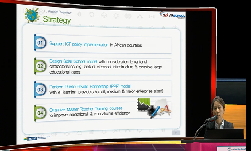The purpose of this study was to explore the music education practices of eight homeschooling families in the metropolitan Phoenix area of Arizona and to provide a better understanding of music education in the homeschooling community for those who a...
http://chineseinput.net/에서 pinyin(병음)방식으로 중국어를 변환할 수 있습니다.
변환된 중국어를 복사하여 사용하시면 됩니다.
- 中文 을 입력하시려면 zhongwen을 입력하시고 space를누르시면됩니다.
- 北京 을 입력하시려면 beijing을 입력하시고 space를 누르시면 됩니다.
https://www.riss.kr/link?id=T11187308
- 저자
-
발행사항
[S.l.]: Arizona State University 2006
-
학위수여대학
Arizona State University
-
수여연도
2006
-
작성언어
영어
- 주제어
-
학위
D.M.A.
-
페이지수
306 p.
-
지도교수/심사위원
Adviser: Sandra Stauffer.
-
0
상세조회 -
0
다운로드
부가정보
다국어 초록 (Multilingual Abstract)
The overarching research questions which guided this study were: (1) Why do parents elect some form of music education in the homeschool curriculum and what do they believe their children will gain from music study? (2) What are the homeschooled students' responses to music education as a part of their studies, and to what extent do these experiences affect continued participation in musical activities? (3) How do families provide music education for the children, and who does the teaching? (4) If the homeschool families engage music teachers outside the home, what are the educators' responses to homeschoolers participating in their music classes and ensembles?.
These homeschool families have access to a wide variety of options for musical learning: resources provided by the homeschool community, resources provided by the church, public school resources, and civic or community resources. In discussing why they value the study of music for their child as a part of the homeschool, homeschool parents offer explanations that appear to articulate one of three broad ideas: music is an essential part of the whole, be it a whole person or a whole program of study; music enables connectivity between persons, either through shared knowledge or experience; and that music is an important component of religious expression. The students who participated in this study are generally affirming of their music classes and ensembles; however their motivations for participation vary.
The purpose of this study was to explore the music education practices of eight homeschooling families in the metropolitan Phoenix area of Arizona and to provide a better understanding of music education in the homeschooling community for those who are not familiar with this educational subculture. Participants in this phenomenological inquiry were the parents, and children of homeschooling families, and the music education providers retained by the families. Data were drawn from in-depth interviews with these informants, observations of music classes and ensembles in which the homeschool students participated, and artifacts pertinent to these activities.
The overarching research questions which guided this study were: (1) Why do parents elect some form of music education in the homeschool curriculum and what do they believe their children will gain from music study? (2) What are the homeschooled students' responses to music education as a part of their studies, and to what extent do these experiences affect continued participation in musical activities? (3) How do families provide music education for the children, and who does the teaching? (4) If the homeschool families engage music teachers outside the home, what are the educators' responses to homeschoolers participating in their music classes and ensembles?.
These homeschool families have access to a wide variety of options for musical learning: resources provided by the homeschool community, resources provided by the church, public school resources, and civic or community resources. In discussing why they value the study of music for their child as a part of the homeschool, homeschool parents offer explanations that appear to articulate one of three broad ideas: music is an essential part of the whole, be it a whole person or a whole program of study; music enables connectivity between persons, either through shared knowledge or experience; and that music is an important component of religious expression. The students who participated in this study are generally affirming of their music classes and ensembles; however their motivations for participation vary.
분석정보
연관 공개강의(KOCW)
-

Education Policy at the Party Conferences
Teachers TV Teachers TV -

Alcohol Education: Here's What We Want
Teachers TV Teachers TV -

Personal Finance Education: The Money Quiz
Teachers TV Teachers TV -

Early Sex Education: The Debate
Teachers TV Teachers TV -

2014 이러닝 국제 콘퍼런스 : What is the Lessons from Education Support Project~
한국교육정보진흥협회 Boseon, Kim






